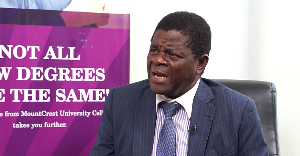Accra, April 28, GNA - The National Commission for Civic Education (NCCE) on Friday started national activities aimed at educating citizens on the principles of social auditing as a means for poverty reduction. The activities framed up in the sixth Annual National Constitution Week celebration was also dedicated to widening the scope of local participation and social auditing for poverty reduction with the infusion of participatory democracy, the NCCE stated in Accra. The NCCE, organisers of the annual event, explained that the essence of citizens' participation in local governance was to overcome challenges of poverty, enhance democratic governance and create public awareness.
Speaking at the opening ceremony in Accra on Friday, Mr Laary Bimi, NCCE Chairman, said local participation in governance and social auditing of State institutions by the citizenry was crucial to alleviate poverty in the country.
"Social auditing is not about Parliament, the Judiciary or Executive. It is about the citizens and the district assemblies, because while the State initiates the policies, citizens must ensure that the nation moves the way they want", he said.
He said for the country to attain its development objectives, citizens must monitor and hold accountable those entrusted with power and responsibility to man the country, to ensure that they performed to task.
Mr Bimi said the country's governance paradigm had the people and the district assemblies at its base and they must be responsible for their own governance and be fully engaged in the development process. Mr Bimi urged the public to serve as watchdogs and to make constructive criticisms in order for the country to attain the Millennium Development Goals.
The celebration would contribute to increased interest and participation of all in the democratic dispensation, to achieve good governance, political stability, national integration and development. It would also reinforce the concept of social auditing to empower citizens to develop civic knowledge and skills, create confidence in them to ask leaders questions, demand answers and become active participants in governance.
"Apathy is an enemy of good governance in towns and villages. Our attempt to raise grassroots activism will make even the most apathetic village or community to wake up and exercise its constitutional rights and responsibilities" Mr Bimi said.
He said for the country to attain its development objectives, citizens must monitor and hold accountable those entrusted with power and responsibility to man the country, to ensure that they performed to task.
Mr Bimi explained that national effort at poverty reduction depended on a governance paradigm that would make government accessible, responsive and accountable at the local level.
"Citizens' participation in social auditing at the local level would result in accountability of State officials and politicians and contribute to a more open, inclusive and transparent society," he said. Mr Bimi said the Commission would use the celebration to encourage the poor and disadvantaged in the districts to play an active and responsive role in the governance of their communities.
He said NCCE would educate the public on the relevance of decentralisation; benefits of effective participation in local governance; the empowerment of women to increase their knowledge and participation in district level politics and offer them the opportunity to access various State interventions for poverty reduction. Mr Bimi said the NCCE would also encourage, the youth, chiefs and other opinion leaders to develop the character and courage to act as social auditors of District Chief Executives, the elected district assembly representatives and heads of the decentralised departments in their localities.
The NCCE Chairman reiterated that the aim of the National Constitution Week was to create an increased and sustained interest and engender the participation of all Ghanaians in the new democratic dispensation for the achievement of good governance, social and political stability for national unity and development.
This year's celebration, the sixth; is on the general theme: "Local Participation and Social Auditing for Poverty Reduction."
Professor Kate Addoo-Adeku of the Institute of Adult Education, University of Ghana, Legon, chaired the ceremony, which was attended by security officers, media practitioners, students and a cross-section of the public. 28 April 06
Politics of Friday, 28 April 2006
Source: GNA


















